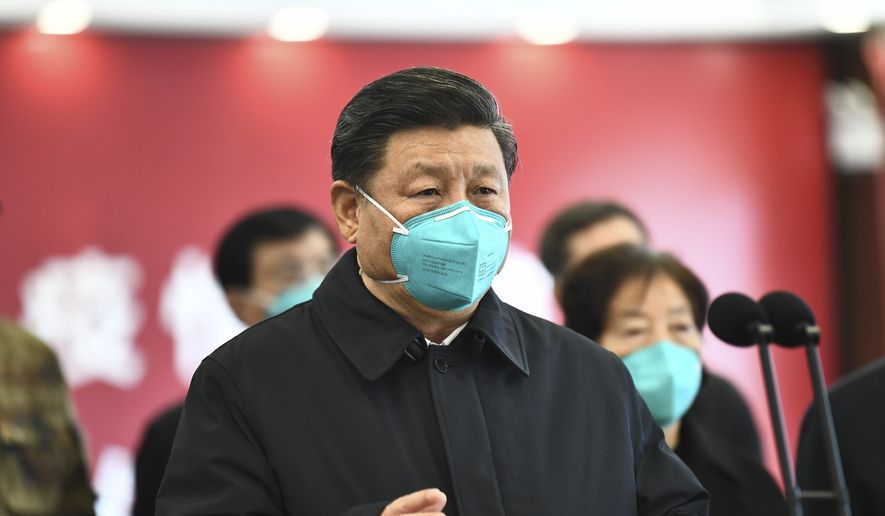OPINION:
On April 26, 1986, the worst nuclear disaster in history occurred at Ukraine’s Chernobyl nuclear power plant. The plant’s reactor core fire, which released airborne radioactive contamination as far as the UK where I was then a student, was finally contained nine days later.
The Soviets initially denied the accident had occurred. Nearby cities were not evacuated and the May 1st International Workers’ Day celebrations took place as scheduled. Chernobyl cost the Soviets considerably — both in funds spent on dealing with the disaster and in international prestige and credibility.
Most important, the reality of what happened at Chernobyl broke through Soviet censorship and exposed the Kremlin’s brazen disregard for human life.
Three-plus decades later, the coronavirus pandemic has exposed Communist China’s fault lines, lines eerily similar to the Soviet Union’s. There are the same obsequious political apparatchiks, the same brittle and opaque bureaucracy, and the same state-controlled media deployed not to inform the public but to preserve the regime’s control and protect the regime’s image abroad.
Immediately following the virus outbreak in late December 2019, Chinese officials in Wuhan withheld warnings from their citizens, downplayed the threat, and punished brave medical staffers who — true to their Hippocratic Oath — tried to sound the alarm. China’s failures helped transform a serious health emergency into a global crisis.
Chinese President Xi Jinping deserves much of the blame for this colossal initial failure. Having seized control of China’s government and centralized power, Mr. Xi has instituted a cult of personality with his political beliefs written into the party and state constitutions. Mr. Xi, who is also the head of China’s all-powerful Communist Party, removed term limits and will rule China for as long as he wishes. The Orwellian mass surveillance system he has overseen now encompasses the internet and deploys ubiquitous closed-circuit security cameras throughout the country. China’s “Social Credit System” measures citizens’ “trustworthiness.” With zero trust in its own citizens’ freedom of expression and access to the rest of the world, Beijing has sought to impose cyber dominance over the internet through the “Great Firewall of China.”
Chinese officials spend much of their time studying party propaganda, especially Mr. Xi’s speeches. Relying on a culture of fear and subservience, the president has promoted a loyal political cadre over experienced professionals.
Wuhan mayor Zhou Xianwang delayed notification of the coronavirus because he required approval from his superiors. Wuhan’s citizens were never told of the infection dangers of the massive Lunar New Year banquet celebrations, held just a few days before the city was finally locked down.
China’s National Health Commission did not issue a warning about the outbreak of the virus until Jan. 19. China arrested and censored front-line doctors and others who dared to share information about the outbreak, often at the cost of their own health.
But the coronavirus has nevertheless exposed the existential threat to Mr. Xi’s dictatorial regime: democracy.
In 1983, President Ronald Reagan famously called the Soviet Union an “evil empire.” Reagan’s clarion call for freedom and liberty inspired Soviet citizens, for whom the U.S. was a beacon of liberty, freedom and democracy.
Today, the challenge comes from China. Beijing is militarizing the South China Sea; stealing our intellectual property as well as military and trade secrets; mounting massive espionage operations against us; and using the “Belt and Road” initiative as a cover for its geopolitical ambitions and debt diplomacy strategy.
While we should counter China with the more blunt national security and conventional military tools, let’s not neglect our soft power, especially democratic values such as freedom of speech and assembly, which have always been the most potent arrow in our quiver against authoritarianism.
The Trump administration should of course continue to work with China on containing and finding a cure for the coronavirus, but without ever forgetting Reagan’s eloquent promise of freedom and dignity to China’s repressed people.
⦁ Daniel N. Hoffman is a retired clandestine services officer and former chief of station with the Central Intelligence Agency. His combined 30 years of government service included high-level overseas and domestic positions at the CIA. He has been a Fox News contributor since May 2018. Follow him on Twitter @DanielHoffmanDC.




Please read our comment policy before commenting.